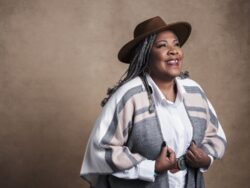
About our guest author: Melody Starya Mobley’s experiences as the first black woman serving as a forester for the USDA are remarkable: both for the firsts she embodies and for the years of abuse and oppression she experienced within that system.
Now, Melody shares her personal stories to create positive change for groups historically excluded from accessing American natural spaces.
With the few federal protections that exist currently being stripped away, it’s more important than ever for stories like these to be told. To read more of Melody’s writing, visit her website.
Image credit: Kirth Bobb
As you may know, I was the first African American female forester in the USDA Forest Service. As such, I was routinely the only person of color, and usually the only classified professional woman, on staffs, in meetings, assigned to travel, and so forth. My colleagues were typically much older White males.
I had to learn to protect myself from them in many ways.
1. Document, document, document.
Although I had seniority and had served as Assistant Director for weeks at a time, my White male colleagues typically got the choice assignments such as representing the staff director. To remedy this, I had to continuously meet with my supervisor to bring this to his attention. When I volunteered for these opportunities as they were announced by the Director, he and my colleagues typically laughed in my face. At one point, he told me he could see me working in the administrative arm of the Forest Service but could not envision me being the Director of Timber Management. I would document each assignment denied me and keep the records at home where they were in a secure place.
Document everything: meetings with supervisors, behavioral incidents, and patterns of exclusion.
In meetings, I was ignored. Later, a White male would say the same thing I had, and it was lauded as a great contribution. I would often point this out and the reception was sheepish grins. But nothing changed: this happened again and again. Much like my requests for choice line assignments, I made sure to let my other administrators and especially my mentor know about this pattern. Sometimes, the behavior was so bad that we filed an equal opportunity employment (EEO) complaint.
Use the systems to your advantage, and escalate reports when appropriate.
During travel assignments, my male—white, black, Hispanic, and otherwise—colleagues often behaved as if they were not married, especially when they were drinking alcohol. They would openly flirt with me, show up at my room, call me, and make inappropriate suggestions and comments. Again, I documented each occurrence and reported these incidents to my mentor(s).
Make sure your mentors are in the loop, so they can support you through administrative processes.
2. Meet in public spaces.
Even during potential career boosts, I had to be on special guard. Before I was retired, I asked the head of a USDA agency if he could hire me and made a severe mistake when he asked me to drop off my resume at his hotel room. I should have said, “I’ll leave it at the front desk for you”—but not wanting to offend this agency leader, I took it to his room as he’d requested. He said come in and I did; within a couple of minutes, he placed his hands on my breasts. I was horrified. Knowing this man could ruin my career, I felt compelled to apologize to him for the professed “misunderstanding.” I sought out my supervisor, told him what had happened, and vomited at his feet. I learned to never have a one-on-one business meeting in a hotel room.
Choose a public place like the lobby and/or involve more people in the meeting if it must take place in a private room.
3. Find a mentor.
It’s critical to find one or more mentors at every stage of your career. Not only should they offer great sounding boards, they should also have enough clout to protect you from the ramifications of reporting physical and emotional attacks.
When I was raped very early in my career, I didn’t know about having mentors and didn’t feel like I could tell anyone because I wouldn’t be believed. At this stage, and during later incidents like the hotel room meeting, my colleagues and even some supervisors regularly told me that “Black women are only good for one thing”—implying sex.
Find mentors, and mentor your subordinates: we’re in this together.
Even though I was retired from the USDA Forest Service in 2005, I still have several mentors I talk to. I also have taken my place as a mentor to younger foresters, firefighters, wildlife biologists, and other employees in related fields. It’s important to discuss what happened to me, to help others learn how to protect themselves in professional environments.
![]()
Read more of Melody’s writings
on the American Green blog.
